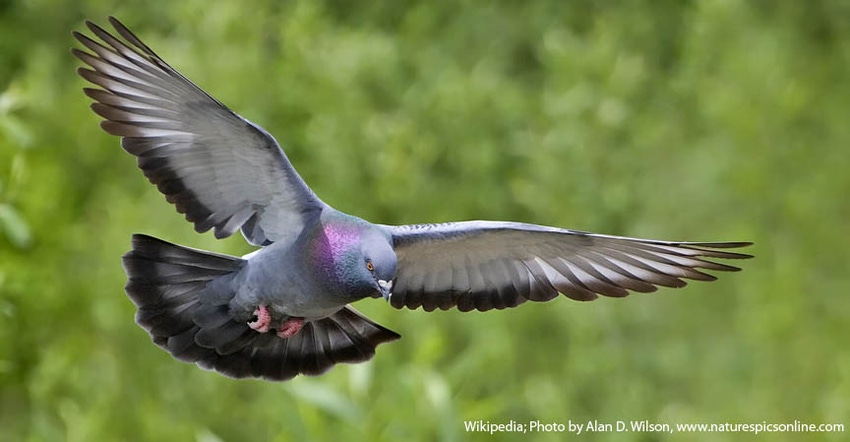July 17, 2013

Pirates, predators, power lines and poor luck — they brave it all for hundreds of miles, while carrying along the million-dollar hopes of the haves and have-nots. Pigeons are the new thoroughbreds in China and everyone has taken notice — breeders in Europe and even the feed industry in the United States.
Pigeon racing goes back hundreds of years and probably a lot longer. The races are held in countries across the globe, but the sport is at fever pitch in China. From Vice: “Twenty years ago — sort of a poor man’s delicacy, but now with the new Chinese economy, it’s become a rich man’s play thing.”
China’s nouveau riche love designer handbags, the finest wine, and sleek cars — but they’re also quick to slap down bags of cash on a pigeon. Money is swirling around Chinese pigeon racing, and the torrent shows no signs of abatement. In 2011, a Chinese entrepreneur payed $200,000 for a pigeon — Blue Prince — at PiPa, the world’s premier pigeon auction house located in Belgium. PiPa sold 218 pigeons that day — for an astounding $1.8 million.
And in 2013, PiPa sold Bolt (named after Olympic sprinter Usain Bolt) to another Chinese businessman for $400,000. An entire lot of 530 Belgian-bred pigeons went for almost $6 million that day, with nine of the 10 most expensive birds headed to China or Taiwan. (In 2009, The Telegraph reported that Chinese mafia gangs were hitting Belgian pigeon coops and stealing the prized birds. “Rather than attempting to smuggle their prey abroad, criminals will kill the pigeons and cut of their identifying rings to be used on much less valuable birds bred in Asia.”)
Blue Prince, Bolt and the other auction birds weren’t bought to race; they are strictly for breeding. As PiPa’s Ya Minna told The Independent, “A pigeon is a far better investment than a fine bottle of vintage wine. You can breed it; it will have children and grandchildren.”
Pigeons may look ordinary, but the actual races are a subculture of chaos. With entry fees ranging from a $200-$1,000, several thousand birds are loaded onto a communal truck and the trek to the starting line begins. The winner will not be the first pigeon to return. The birds are all banded with GPS locators and when they arrive home at their individual coops, a scanner records the arrival time and the winner is determined according to which pigeon flew home at the highest average speed. (This is a sport tailor-made for hijinks and corruption.)
The long haul home
The truck may drive 500-700 miles away, and then the birds are released as the marathon begins. Pigeon pirates are on alert, hoping to catch returning birds to sell on the black market; hawks are always on the prowl; bad weather may claim birds; and disorientation may be a factor.
This is no horse race with a two-minute hurtle towards euphoria or dejection; it’s a dry-mouth game of patience for the pigeon owners and bettors. The wait will last hours; and depending on whether it gets dark and the pigeons roost, it may lapse into the next day.
When the birds arrive home (the strongest birds will fly 600 miles without stopping), the tabulations are made, and the results are announced over the Internet and text. The winners gloat and count their cash; the losers lick their wounds; and the breeding begins.
With the glut of cash in Chinese pigeon racing, the U.S. feed industry has taken note. Jos Zamzow, Meridian, Idaho, believes his family company, Dynamite Marketing, has perfected a high-performance pigeon feed. The News Tribune reports that Zamzow’s first test shipments of the feed concoction will arrive in Taiwan this summer. “After they start winning races, we expect there will be significant demand … pigeon racing is popular all over Asia.”
Zamzow already markets pet and pork feed in Taiwan. “Now Zamzow is betting that Dynamite can transform Idaho-grown safflower and corn — and a top-secret, blood-boosting brew of mushroom powder and yeast cell wall extract it makes in its 102-year-old feed mill — into an annual export business worth up to $15 million.”
Spiraling pigeon auction prices, criminal bird gangs, and a mad gambling boom — a fitting backdrop for a capitalist sport once banned by Chairman Mao.
Follow me on Twitter: @CBennett71
Blog archive
Farmer guilty of defending family with shotgun
Agriculture apocalypse just around bend, again
DIY biotech a glowing minefield for USDA
Meteorite find a golden harvest for farmer
Wild dog plague crushing livestock industry
Days of wine auctions and gay marriage
Agriculture's burden of technological intolerance
Nuggets of wisdom from the March Against Monsanto
Farmer’s death puts national focus on killer bees
Cliff Young — the farmer who outran the field
Wine skeptic takes on climate change report
PETA drones a trophy prize for US hunters
Biggest wine hoax in history reveals trade secrets
You May Also Like




